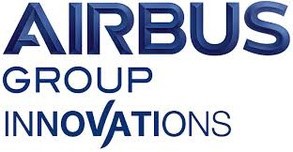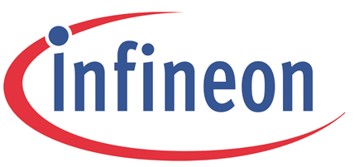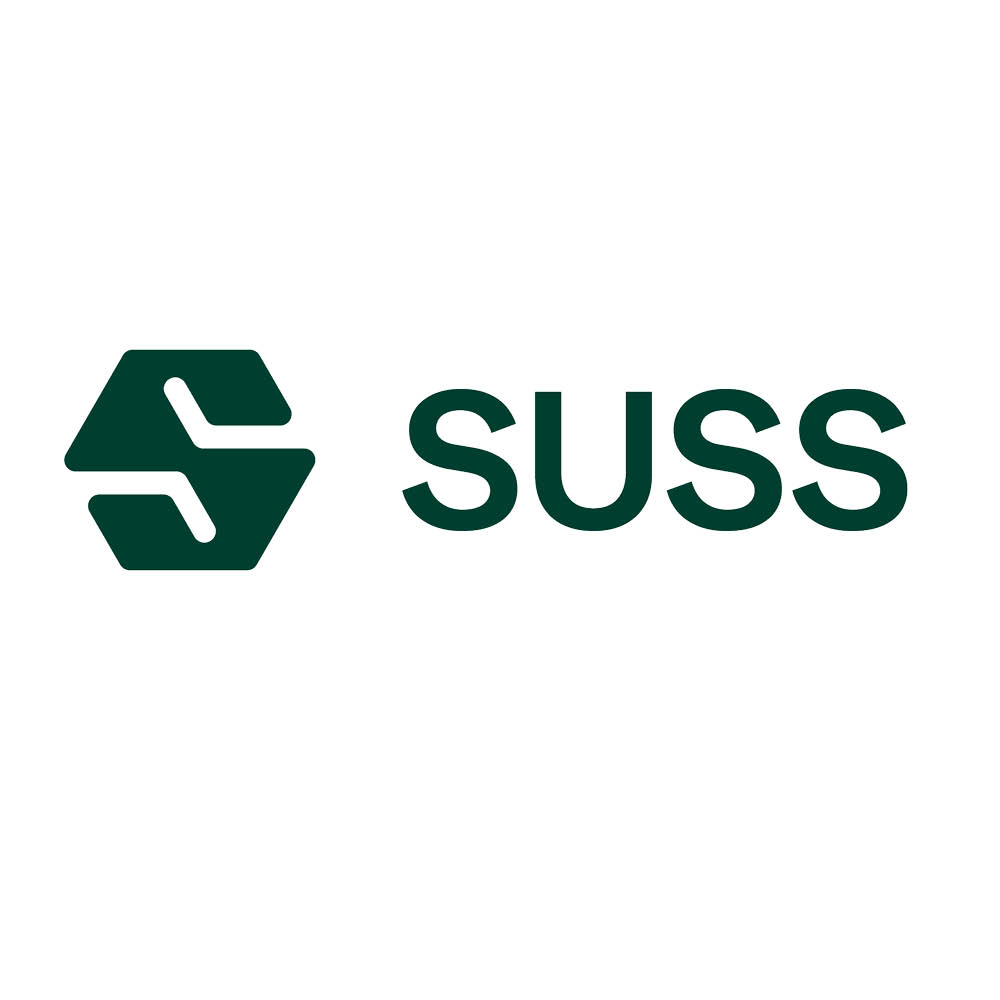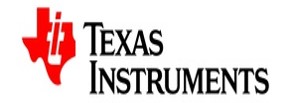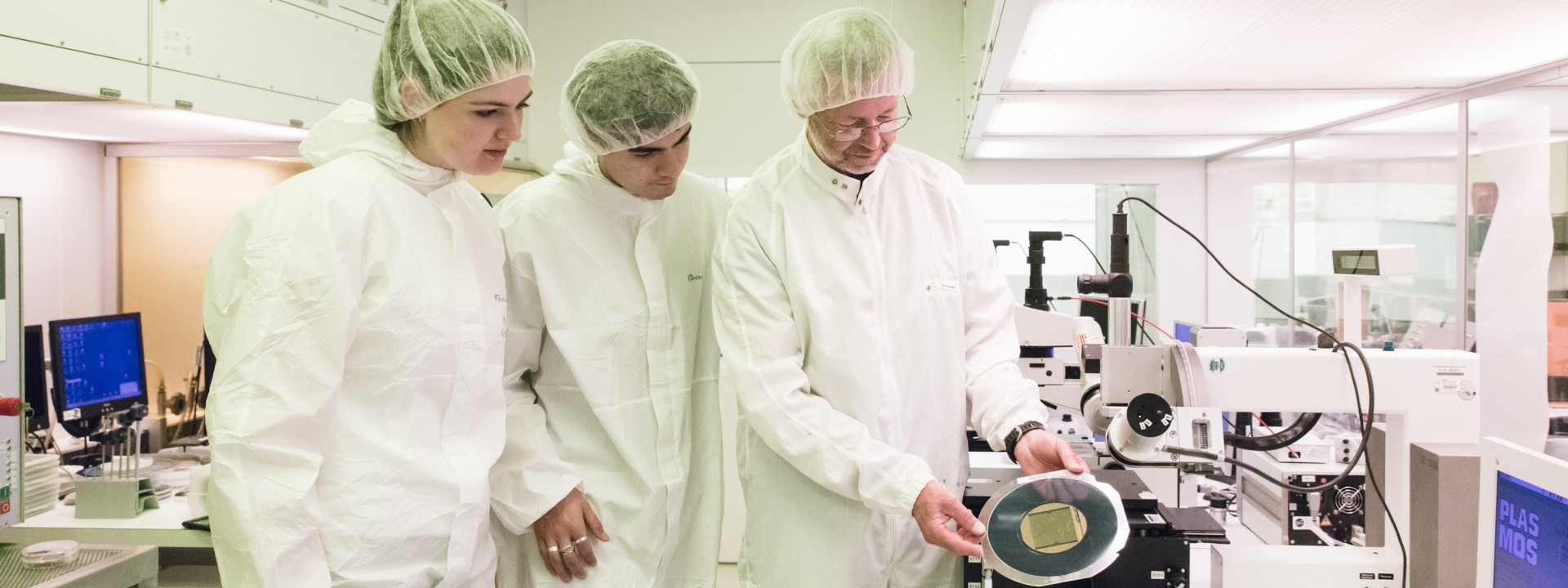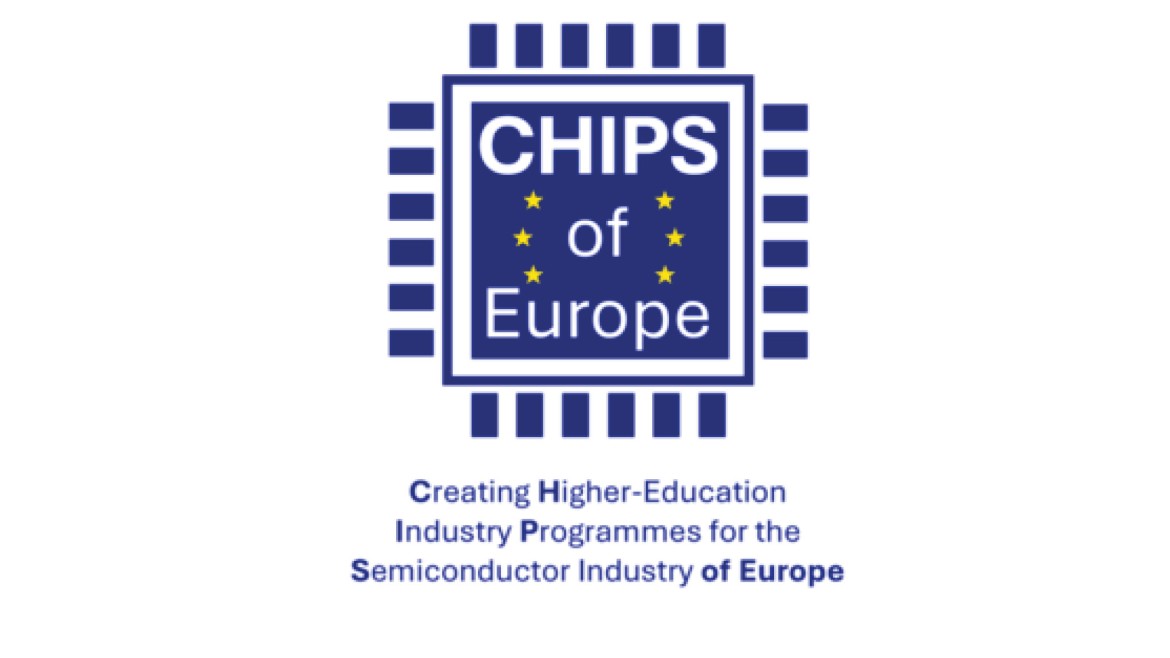Micro- and Nanotechnology (M.Sc.)
Micro- and Nanotechnology is a highly interdisciplinary field. Applications can be found in sensors and transducers technology, aerospace, electronics, medical- and biotechnology, laser technology, and many other fields.
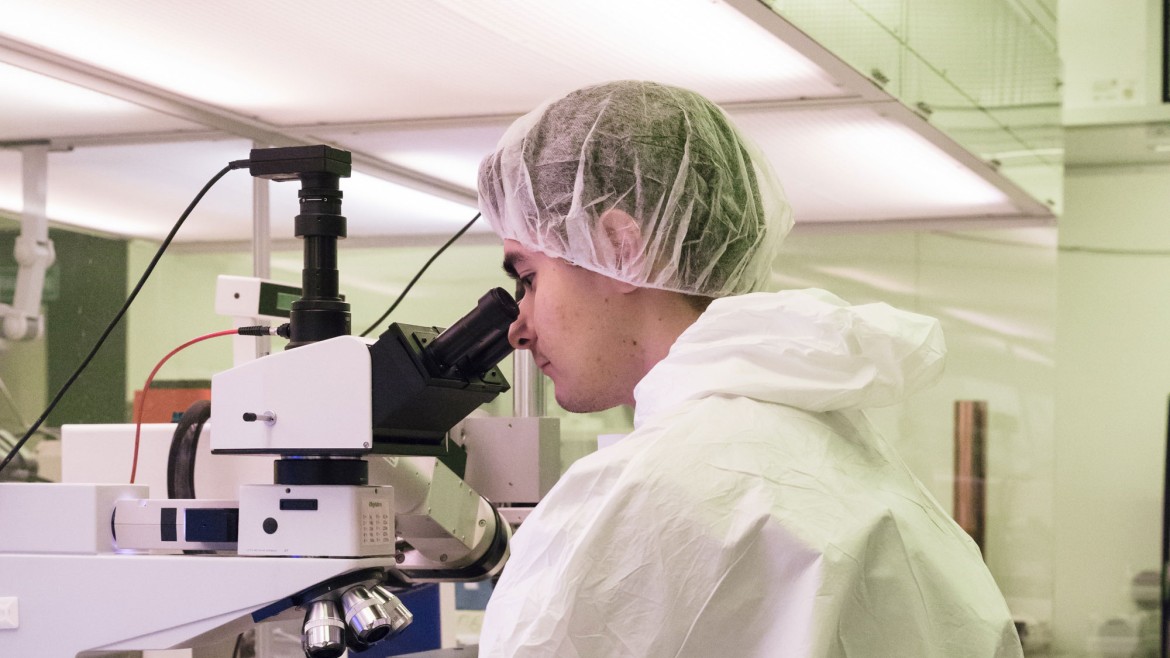
You strive to qualify yourself for your career in a highly future-oriented field, and you seek for a scientific work with innovative technology – in this case the Master study program Micro- and Nanotechnology is the perfect choice.
A study program is offered with
- a broad choice of modules and the possibility for an individual specialization,
- German and English lectures,
- very good options for an international exchange,
- the opportunity to participate in a double degree program with the Institut National de la Recherche Scientifique near Montreal in Canada,
- many different laboratories.
We highly value a practice-oriented education with a profound fundamental knowledge.
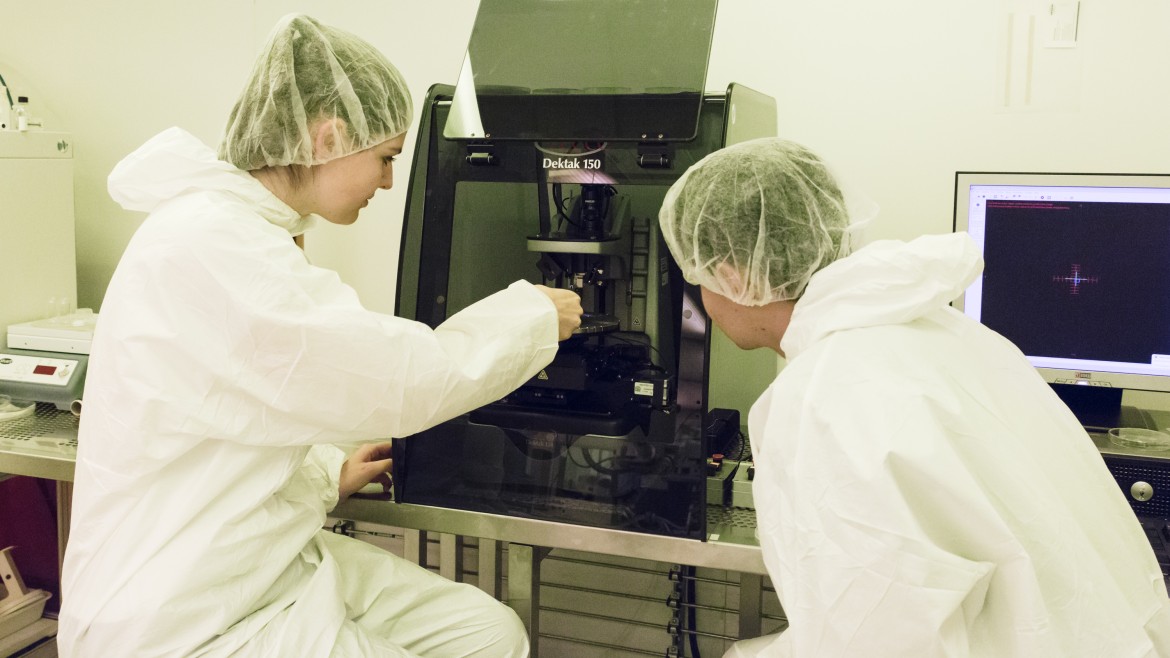
Some facts regarding the program:
- Start: summer- and winter term possible (application - in German)
- Degree: Master of Science (M. Sc.)
- ASIIN accredited (since 2003)
- full time (3 semesters) or part time (3 to 6 semesters)
- possibility for subsequent PhD studies.
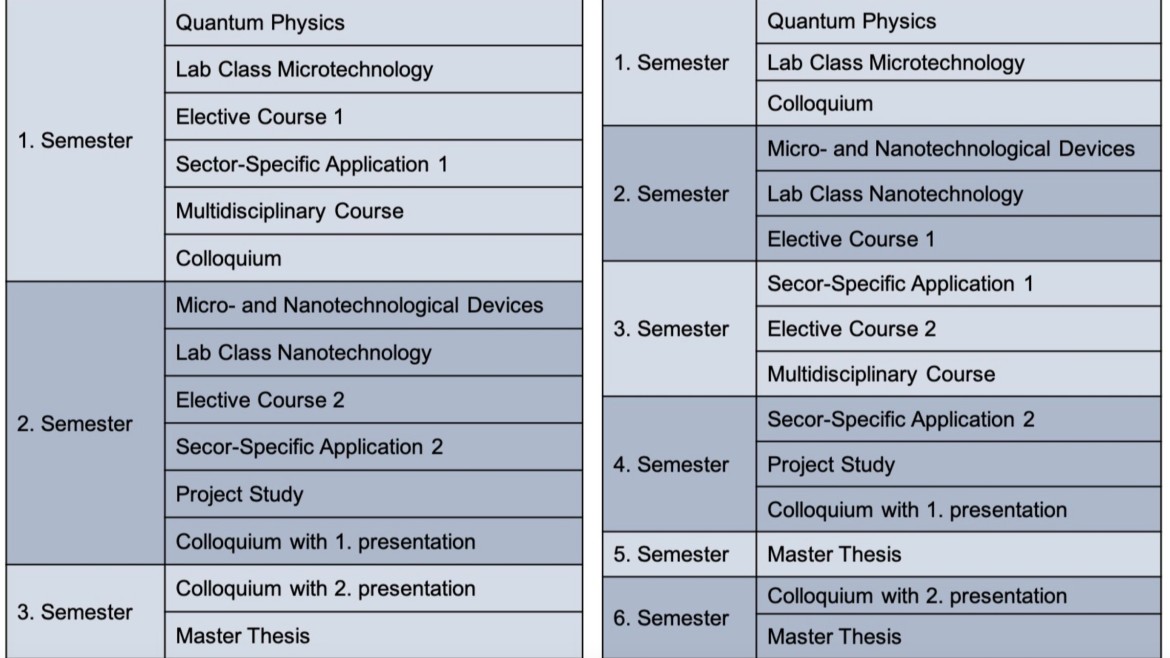
To enable a flexible course of study, the compulsory courses are typically offered in summer and winter term, so that students can pick up their studies in both semesters.
Students, who have not studied physics or related programs before, or professionals, who spent some time outside the university, can attend mathematics and physics crash courses in the beginning.
Professionals as well as students with a Bachelor´s degree who plan an early career entry have the possibility to enroll for part-time studies. A later change is not possible.
The two figures show a possible course of study for full- and part-time. Especially the elective courses can be changed in order.
In order to enroll in the program, you must meet the following qualifications. You have either achieved or will soon achieve a Bachelor´s Degree or similar Diploma in one of the fields of the natural or engineering sciences, respectively a similar field with a final grade better than the equivalent German grade "good". Your degree work was attained either at a German university or at a foreign school which is properly accredited.
The Bachelor's degree covers at least 180 ECTS credit points and at least six theoretical semesters. The completion of a practical semester or an industrial internship of at least 18 weeks during the Bachelor's studies is required. A German language certificate, level A2 and a minimum of 10 ECTS in physics are required.
Applicants who do not meet the grade requirement have to proof their technical qualification in an oral entrance examination. This examination is offered after the correct application in due time and extends over 20 to 30 minutes. The entrance examination serves as proof for sufficient background skills in mathematics, fundamentals in physics, basics in semiconductor technology, and practial experience. The examination is held by two full professors. For details, please refer to the Study and Examination Regulations (in german).
Most lectures are held in German, but a number of courses is offered in English so that the program can be studied in English. Still, German language skills on level A2 are required to have a larger choice of modules and to be able to find appropriate positions for the project study and Master thesis in industry.
Courses start: Annually on October 1st or March 15th – Application period
for courses starting October 1st: May 1st to June 15th,
for courses starting March 15th: November 15th to January 15th.
The objective of the Master's degree program is to take into account the cross-sectional function of micro- and nanotechnology and to impart knowledge about the creation, research, and use of the smallest structures and systems in an interdisciplinary training at the interface between natural sciences and engineering. Subjects based on physical principles are more strongly represented. Students can specialize through elective modules.
Students are enabled to independent and in-depth application and independent development of scientific knowledge and processes in the professional field of micro- and nanotechnology. Graduates of the course have trained analytical thinking and judgment in the field of micro- and nanotechnology as well as practical research skills and knowledge.
In addition to the technical qualification goals, the course aims to train and deepen interdisciplinary skills in the areas of self-organization, international and intercultural teamwork, and presentation and discussion in German and English. Future skills, such as digital and IT skills, technological skills, and personal and methodological skills are improved through lab classes, group work, presentations and projects, especially in the cross-master modules.
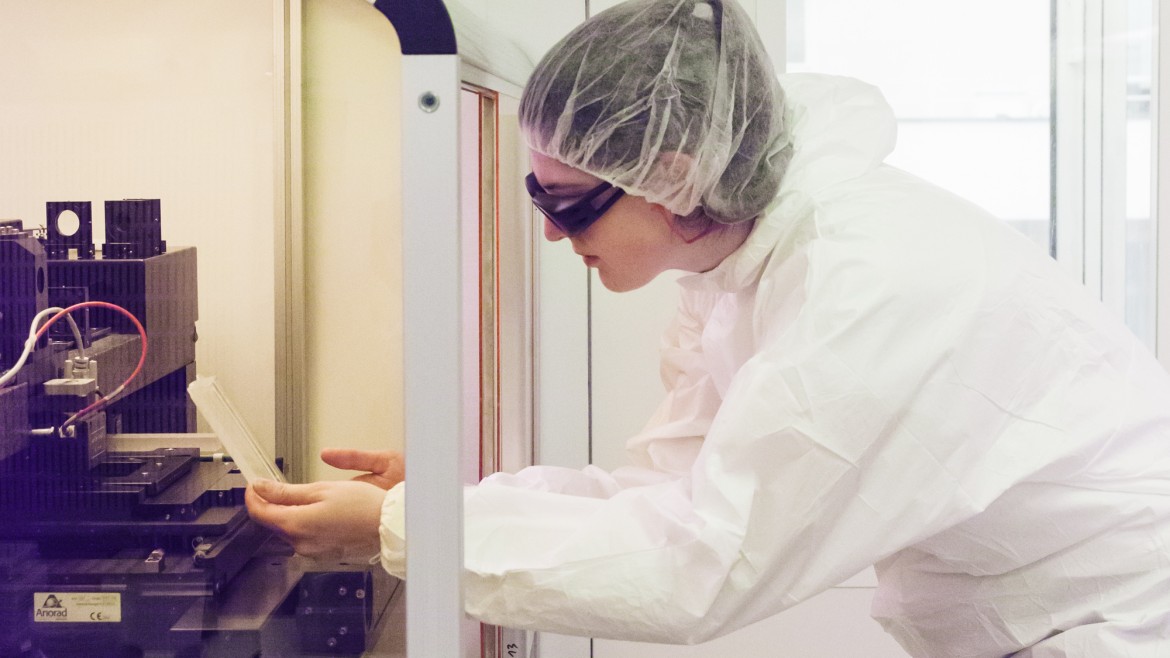
The professional responsibilities of our graduates cover the entire range of careers and responsibilities in these high-tech fields of endeavor. The career opportunities include independent planning, coordination, and supervision of research and development projects, management functions, and industrial consulting.The interdisciplinary nature of this course of study provides the graduates with the best possible qualifications for the increasingly important interfacing positions of modern industry.
Graduates can be found in all important fields of micro- and nanotechnology, e.g. in
- semiconductor and electronics industry,
- information technology,
- aerospace,
- automotive industry,
- chemical industry,
- biotechnology or pharmaceutical industry,
- optics and laser technology,
- research institutions.
Approximately one-third of the graduates go on from their successful completion of this course of study to doctoral and post graduate work.
The Munich metropolitan area evolved into one of the centers for research in micro- and nanotechnology within Germany and Europe.
Outstanding industrial firms such as Siemens, Infineon Technologies, or Airbus, as well as a number of small and mid-sized firms are located here. Further, over the last years, a significant number of successful start-up firms have arrisen from the academic environment Munich provides.
The Department of Applied Sciences and Mechatronics, together with our instructors, has outstanding connections to academic institutions and industry and provides graduates of the Course of Study Micro- and Nanotechnolgy with excellent networking opportunties.
The Master program Micro- and Nanotechnology is embedded into a strong research environment. This becomes evident by advanced research facilities such as the Center for NanoScience,the "Excellence Network Nanobiotechnology", the NanoTUM,and the Nanosystems Initiative Munich, which is supported by the Excellence Initiative of both the Federal and State governments and of which the Department of Applied Sciences and Mechatronics at the Munich University of Applied Sciences is also a member.
The laboratories of the program have projects with academic and industrial partners. Next to joint research projects, the good network with industry is also reflected by lecturers coming from the industrial partners.
Furthermore, the Master's course is strongly supported by an Industrial Advisory Board, which includes representatives from companies from southern Germany internationally recognized as leaders.
The program sets high value on internationalization.
Since 2023, we have intensified the exchange with our long-standing Canadian partner in the Master's degree program in Micro and Nanotechnology and concluded a double degree agreement with the Institut National de la Recherche Scientifique near Montreal, Canada.
This double degree program is based on students studying their first year at their home university, spending the second year at the partner university and then receiving their degrees from both universities.
Gaining international experience during your studies is a great opportunity. This includes not only the exchange with students from all over the world in Munich, but also your own experience abroad.
Many courses are offered in English, so we are very pleased to welcome international students to the course. At the same time, more and more students are also gaining experience abroad: as part of lectures, project studies or Master's theses. And during the colloquium students give at least one presentation in English.
Furthermore, a good network to foreign universities and research institutions exists, which offer lectures and final theses in the field of micro- and nanotechnology. For an easier planning of the stay abroad, an overview over partner institutions with a course offer in English suiting the program in Munich can be downloaded.
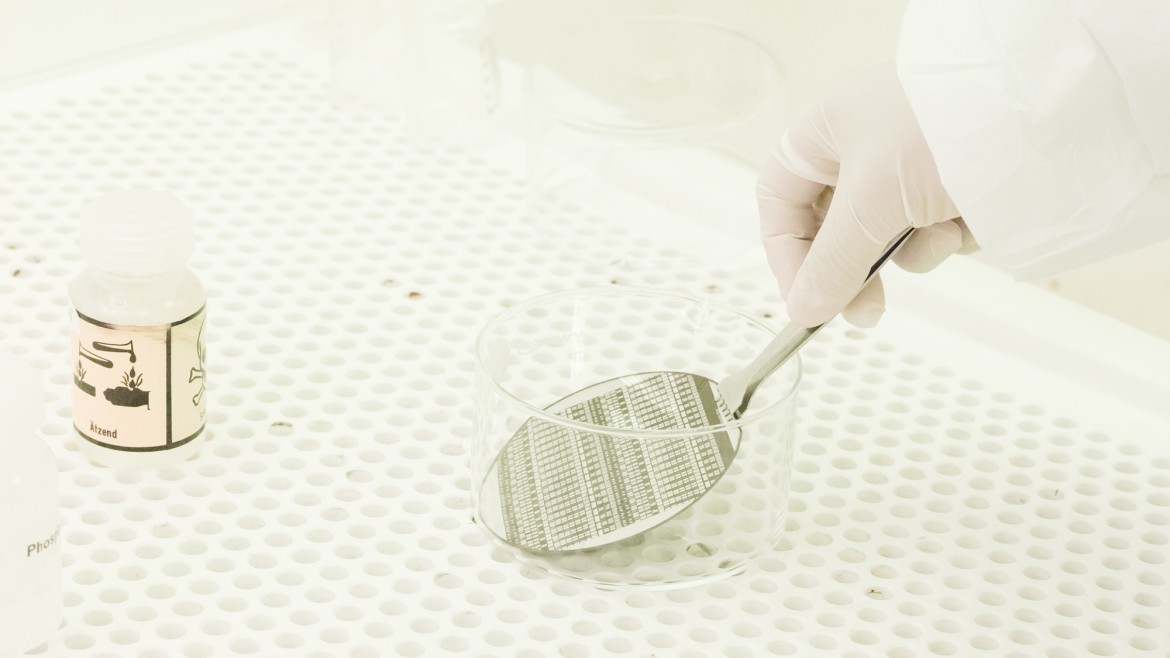
The study program Micro- and Nanotechnology is very interdisciplinary and practice-oriented. Therefore, two lab classes involving many experiments in the laboratories of the Department of Applied Sciences and Mechatronics are integrated into the course of study. Furthermore, together with regional, national, and international partners research projects are realized. This way, students can network with partners from science and industry at an early stage of their studies.
- Thin Film Technology
- Solid State Physics
- Instrumental Analytics and Environmental Analytics
- Lasercenter
- Microsystems Technology
- Modelling and Simulation
- Nanoanalytics and Biophysics
- Nano Structures Technology
- Surface Enhancement
- Photonics
- Material Siences
Links to external institutions related to Micro- and Nanotechnology:
An Assortment of Universities and Research Centers:
- Center for NanoSience (CeNS)
- Excellence Network Nanobiotechnology (ENNaB)
- Frauenhofer Institut für Mikrosystemtechnik (ISIT)
- Max-Planck-Institut für Biochemie
- Excellenzcluster Nanosystems Initiative Munich (NIM)
- NanoTUM
- Walther-Meissner-Institut (WMI)
- Walter-Schottky-Institut (WSI)
- Center for Applied Tissue Engineering and Regenerative Medicine (CANTER) at Hochschule München
- Institut national de la recherche scientifique - Laboratory of Nanophotonics nanoelectronics, Montreal, Canada
- LNIO - Laboratory of Nanotechnology, Instrumentation and Optics, Troyes, France
An Assortment of Additional Micro- and Nanotechnology Links:
Industrial Advisory Board
The Master in Micro- and Nanotechnology is supported by an Industrial Advisory Board.
